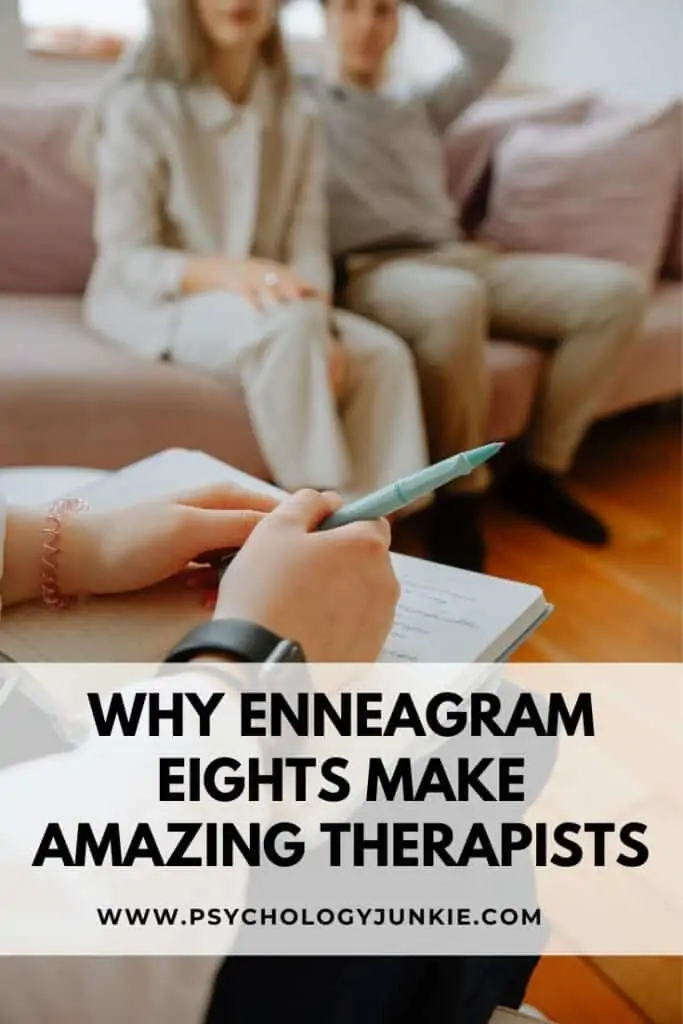Why Enneagram 8s Make Amazing Therapists
Enneagram 8s are probably one of the more misunderstood Enneatypes in the personality community. They are often depicted as being angry loners who are violent, shirk societal norms, and hate being controlled (at their absolute unhealthiest). However, when Enneagram 8s have integrated in a healthy way, they are actually able to connect with people in a truly authentic way, AND they are able to show others the trail that they blazed toward healthy integration and well-being. My journey to integration as a healthy 8 is no exception, and while my life has certainly had its challenges, I have found that my Enneatype has been absolutely integral in my role as a therapist. What follows are 7 reasons why healthy Enneagram 8s make great therapists.
Not sure what your Enneagram type is? Take our questionnaire!

1) They care, but they do not lose themselves.
Being a therapist can be one of the most rewarding careers in the world. You have the privilege of walking alongside people as they journey toward personal well-being – there truly is nothing more rewarding than that. However, if you don’t have good boundaries, not only can you cause harm to the person, you can also land yourself into a hot mess of liability. A healthy 8 is very good at assessing a situation, being a good anchor during a crisis, but they also know when they need to step back and allow things to take their course. Setting appropriate boundaries, and maintaining them, is integral to effective work with clients as we need to ensure that we do not feed into the many psychological defenses which can crop up over the course of therapeutic work. A healthy Enneagram 8 can set boundaries in a way that maintains respect and compassion for the client and their situation, and if not, how to terminate with a client in a way that is ethical.
2) They know what they can and cannot do.
Many people who become therapists do so out of a desire to help others to achieve their therapeutic goals. Sometimes, there can be a lot of pressure to offer support to clients who are outside of your scope of practice because it can feel almost like the client is being let down if you don’t help them. In my practice, I have no issues referring people out whose cases require specialized support. I am totally okay admitting that I do not know something, and that I am not the right person to walk alongside that client on their journey. Healthy Enneagram 8s know their limits, and are comfortable referring someone on to another therapist who will be able to support that client in the way that they need.
3) More likely than not, they have been a client.
I want to be sure that I clarify that I am not suggesting that people should only see a therapist who has shared their exact life experiences. What I mean by this is that the often shared early traumatic experiences among 8s, as well as their unique journey toward integration, often puts them in the client seat themselves (often with the goals of learning to effectively manage their emotions and build healthy relationships). A healthy 8 knows that while they are badass and capable, they do need others to help them along their journey to healing. This lived experience of understanding what it is like to be a client, and the added compassion and empathy toward clients who struggle with confronting their deepest fears (because a healthy 8 has done this, and continues to do it lifelong), adds an extra layer of authenticity to the client/therapist relationship.
4) They are authentic.
As mentioned above, a healthy 8 absolutely knows their limits as well as where they stop and their client begins. The assertiveness of communication, which is a trademark of the healthy 8, is especially important in therapy. A healthy 8 is able to be honest with their clients and to call them out on their defenses in a way that allows the client feel human. An 8 has the capacity to model appropriate vulnerability, as well as to repair normal disruptions in the therapeutic relationship, while maintaining ethical integrity. This type of modelling not only benefits the client, but also can serve as a reinforcement for the 8 that they can be assertive and caring.
5) They understand what lies beneath behaviour.
One of the toughest things to deal with as a therapist is avoidance strategies that are often present when you are about to uncover a deep-seated fear (such as core beliefs – those of you who have done CBT know what I mean!). Your client could ghost you for several sessions, explode with anger, cry, become very demanding, just to name a few. A healthy 8 is able to look beyond the behaviour to the true cause at the root. This unique ability to clearly assess the root cause allows the 8 therapist to calmly, and assertively, be the secure base that the client needs as they uncover these often unconscious fears.
6) They will advocate for you.
A healthy 8 therapist is very attuned to the systems in place which may be impacting their client. If you are the client of a healthy 8 therapist, then you can rest assured that you are likely in good hands – that 8 therapist will work extremely hard to ensure that you are supported, and will help you to build up resources as well as make necessary referrals, to ensure your therapeutic success. Given the 8’s unique life-path, they also may have some unconventional, but effective, ideas to get you on your desired path.
7) They will join with you in your therapeutic journey (rather than tell you what to do).
As an Enneagram 8, I have a massive alarm system in place which alerts me to imbalanced power dynamics. Given that I know that the balance of power is often tipped toward the therapist, I ensure to join with my client in a way that allows them to lead their therapeutic process with me as the guide. A healthy 8 therapist knows that their clients are the experts of their own experience, and we use our naturally inquisitive minds, to guide clients toward their own self-discovery. The specialized attunement of 8s to the power dynamics in the therapeutic relationship can lead to a more balanced power dynamic which fosters growth toward self-efficacy, and independence, for clients.
This article was a labour of love for me – my Enneatype is often touted as being excellent for non-profit, advocacy, and politics. However, I feel that the unique journey that 8s have toward integration, as well as our unique traits, very much creates an ability to be an amazing therapist. In my own journey, I have had to learn emotional regulation, how to build healthy relationships, and effective communication. My life’s journey has led me to be more assertive, excellent with setting boundaries, and more authentic in my approach to what it means to be human. All of this is paramount to an effective therapeutic relationship. I’d love to hear from all of you – have you ever had an experience with a healthy 8 therapist, and what was it like? Leave your thoughts in comments!
Other Articles You Might Enjoy:
The Enneagram 8 – The Challenger Profile
Seven Struggles of the Enneagram 8 Type
About the Author:
M.Levy is a therapist who loves coffee, dogs, and crushing MBTI® and Enneagram stereotypes. She is an INTJ, 8w9, who spends all of her free time researching ways to become the best version of herself that she can be.















Just newly retired after decades of helping in the counseling field I really enjoyed this link. I loved my job and it was hard to leave and challenge myself to take a new slowed down path in life. Doing excess can be hardwired in us 8s.
As an 8 who understood the enneagram initially as an intellectual experience I needed crisis, age and maturity to be more self aware and grow. This isn’t an overnight process. Being vulnerable and sharing has been feared in the past yet it is the path for us 8s for serious change. Others like you more actually when you practice self restraint and listen than spar or try to control. Apology is critical after feedback we have impacted on another.
Finding the enneagram, identifying the right type, being on panels and learning about the other 8 types has been of life long benefit. It has been a joy to meet others who love the enneagram and who can be vulnerable about their struggle and gifts of their type. The journey to be a better self observer and grow has been the best gift in life.
They are intuitive and just know in a way that you know they know…
As an 8 who just started grad school to be a therapist, I greatly valued the insight that this article provided.
I’m an ENFJ 8, retired military preparing to pursue clinical counseling as a 2nd career. When I learned (and strongly resonated with) my enneagram type, it emphasized my fears that I’ll be too bossy, talk too much, or even exert influence during sessions. However, I’ve benefited from years of good therapy and believe I’m on the path of becoming a healthy, well-adjusted 8. (Brene Brown’s work is particularly applicable to us, I think).
Your article was so encouraging! Thank you for being vulnerable enough to share.